“What in the hell was I thinking?”
How many times have you asked yourself this following a less-than-spectacular decision, especially at the ass end of a dumb purchase? Instead of being a willing buyer, you were probably subconsciously manhandled and you didn’t suspect a thing.
Many experts in the art of influence, like Arizona State University professor, Robert B. Cialdini, Ph.D, a self-proclaimed patsy, suggest we are more susceptible now than ever to slight-of-hand salesmanship. Content is the culprit. Or more accurately, the tsunami of information we choose to surf and are swallowed up in every day leads to our rash decision making. But we’ve set ourselves up to hucksterism.
Humanity’s ability to archive, curate and consume unfathomable amounts of information is working against us. Our brains, the ones that brilliantly created the 24/7 library of the internet for instance, are not developed to handle the stimulus overflow it creates. When disseminating information, especially fundamental “yes and no” verdicts of everyday life, we often respond with instinct over intellect. It’s an energy-saving, self-preservation default that is hardwired in all of us. We unwittingly prune our decision tree to one sprout of familiar stimulus, make a snap judgement, and act, sometimes to the detriment of our personal ecosystem.
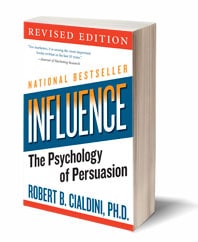
Dr. Cialdini put his fall guy weakness to work and studied the craft of compliance practitioners. He captured the principles of getting people to say “yes” in his book, Influence, The Psychology of Persuasion, and is now one of the foremost authorities on persuasion, compliance and negotiation.
Selling Sustainability is Tricky
Being persuasive for the right reasons is a good thing. And I was curious how to sharpen my persuasion skills, especially when trying to get consumers that are rightly skeptical about green marketing and sustainability to do something good for themselves and the planet. So I read his book, and then tested his compliance theories in the ultimate den of persuasion: A Hawaiian timeshare presentation. Shudder, you might. But I actually invested nearly three hours of my and Michele’s vacation on the Big Island exposing ourselves to the virtuosic sheen of a Shell Vacations Club pitchman.
Here’s how the match went down as the Shell man punched and massaged the six proven compliance triggers within us, including reciprocation, commitment and consistency, social proof, liking, authority, and scarcity. But we were formidable opponents, sturdily armed with the anticipation and recognition of his wax-on-wax-off sales Jujitsu.
I. Reciprocity
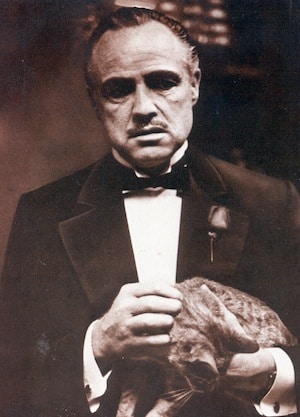 You do me a favor and I am compelled to do one in return. Reciprocity is a deep rooted instinct: the basic currency of social life (See The Godfather). Shell Vacations triggers it immediately by providing a host of significant savings on every kind of Hawaiian adventure – snorkeling, luaus, golf, fishing, dining, etc. – as long as you commit to a timeshare presentation. They also highly recommend that you “take advantage” of their connections first and enjoy your stay on the Big island and THEN do your time in the presentation. They are not only playing off your reciprocity tendencies, but are attaching great experiences to their vacation ownership. Which is a nice set-up for commitment and consistency.
You do me a favor and I am compelled to do one in return. Reciprocity is a deep rooted instinct: the basic currency of social life (See The Godfather). Shell Vacations triggers it immediately by providing a host of significant savings on every kind of Hawaiian adventure – snorkeling, luaus, golf, fishing, dining, etc. – as long as you commit to a timeshare presentation. They also highly recommend that you “take advantage” of their connections first and enjoy your stay on the Big island and THEN do your time in the presentation. They are not only playing off your reciprocity tendencies, but are attaching great experiences to their vacation ownership. Which is a nice set-up for commitment and consistency.
II. Commitment & Consistency
We are all suckers at wanting to look consistent, even when we don’t act consistently. Compliance practitioners prey on this other fundamental need to get us to commit, so we look consistent (See “A foolish consistency is the hobgoblin of little minds.”) One of the first things our salesman – we’ll call him Jim – asked us when we sat down to the presentation was how much we enjoyed our experiences on the island: outings that were mostly provided at reduced rates by Shell. Get their game? To say we didn’t enjoy them would be dishonest and inconsistent with our experience. We had to commit to the wonderful time we were having.
III. Social Proof
Social proof is a term used often in social media. And why not? We’re social animals. Remember the last time you found yourself in an unfamiliar situation? What did you do? You looked at the people around you to provide the social cues as to what was the proper behavior. “The world’s leading detergent,” “The top grossing movie of the weekend,” “A New York Times Best Seller,” are all obvious advertising constructs to get us to buy into pack mentality. After a 20-minute initial sit down with Jim to get to know us, and for us to get to like him, we were herded into a room of 15 couples for a group presentation. When polled, curiously half of the people in the room already owned a timeshare, and they weren’t shy about “spontaneously” sharing how wonderful vacation ownership has been for themselves AND their families. I wonder if they were plants? This had all of the initial markings of timeshare neophytes being corralled for a stampede to the investment abyss (See Jonestown).
IV. Liking
 Why does Facebook “Like.” In addition to anchoring the top three compliance practices, we also do business with and are persuaded by those we like. The front man, we’ll call him Bob, who arranged all of our Shell Vacations-sponsored activities, was a handsome, athletic and affable guy, who also happened to be an alum of ASU, was a former golf pro, and told a hell of a story about entertaining Willie Nelson as his golf partner at Gainey Ranch: three attributes that Michele and I could immediately connect with, although the golf pro is a stretch, given our games.
Why does Facebook “Like.” In addition to anchoring the top three compliance practices, we also do business with and are persuaded by those we like. The front man, we’ll call him Bob, who arranged all of our Shell Vacations-sponsored activities, was a handsome, athletic and affable guy, who also happened to be an alum of ASU, was a former golf pro, and told a hell of a story about entertaining Willie Nelson as his golf partner at Gainey Ranch: three attributes that Michele and I could immediately connect with, although the golf pro is a stretch, given our games.
Jim, who we were handed off to for the presentation, was a fit and tanned 60-year-old, former special ops and drug enforcement agent who also taught Sunday school. I had some consistency problems with his story as the presentation and his reactions to some of our our curveballs unfolded. You’d think a highly trained covert ops guy would be unflappable enough to overcome a change of venue when I suggested we leave the crowded sales floor for the lanai to continue our discussion, as well as locating his misplaced calculator that I had to remind him was in his pocket after suggesting he shouldn’t leave it on the table when we went in for the group discussion. Wax on, wax off. But at one point with both Bob and Jim, Michele and I both looked at each other and said, “I like this guy.”
V. Authority
We naturally gravitate to authority figures. One of Jim’s early ploys was to “have the authority” to provide us a deal no one else could: a “one-of-kind” offer on back-owned inventory. A euphemism for foreclosure. I’m sure the previous owners probably just bailed. It was because of his longevity with the organization that he could offer this “once-in-a-lifetime opportunity.” He was doing us a favor, and it would be inconsistent of us not to commit to such a proven concept at such a great price from such a likable fellow, don’t you agree? Body blow, body blow, faint, upper cut, shield, block, parry.
VI. Scarcity
When we’re afraid we can’t have something, we want it even more (See Tickle Me Elmo). So if you want people to act, you naturally dangle a limited supply of what you’re selling in front of them. Our day began with scarcity. Jim proclaimed that they had more buyers than they had property, and today was our lucky day but we had to act quickly. When we weren’t buying is when Jim pulled out the one-of-a-kind offer of the repo. There is another coercion tactic at play here, too. That is the “contrast principle.” They present the highest price possible on the package, and then reduce the rate, which looks cheap in comparison. You experience the contrast principle in nearly everything you purchase, so beware.
Although all of this sounds extraordinarily underhanded and manipulative, Dr. Cialdini’s message is about using these ancient triggers to motivate people for good. Many great organizations have employed compliance practices to better people’s lives, the community and the world. And the best way to thwart the evil-doers is to anticipate, recognize and use their own tactics against them: Jujitsu like.
Given our all-consuming, harried lives, these principles are more effective now than ever, and they’re everywhere.
How have you been exploited by, or have thwarted, a professional compliance practitioner?

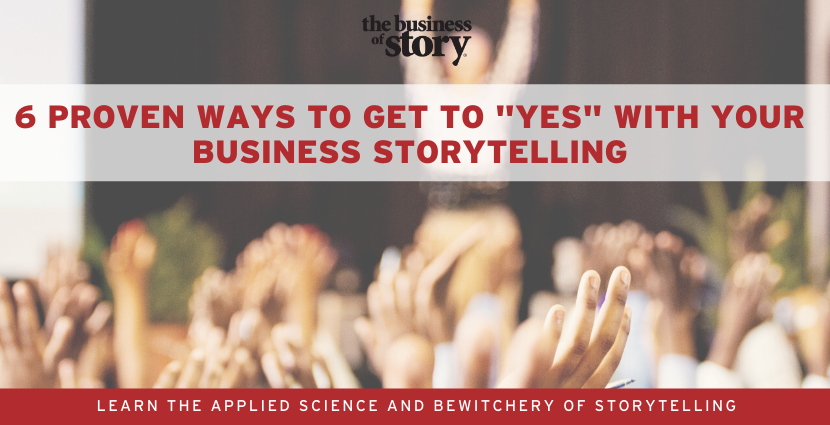


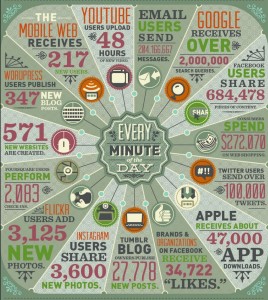


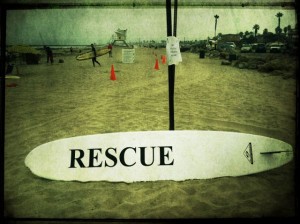





at 9:56 am
[…] Originally Posted on Park Howell: Sustainable Storyteller. […]
at 9:41 am
[…] just to see how those denizens of sales used these techniques. You can read about that experience here, which was fundamental in my development as a brand story creator and […]
at 7:35 pm
[…] tested Cialdini’s six principles of persuasion by entering the dragon’s den of a Hawaiian timeshare pitch just to see how those denizens of sales used these techniques. The experience was fundamental […]